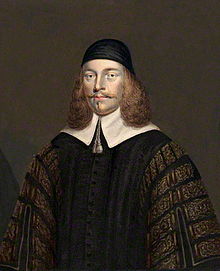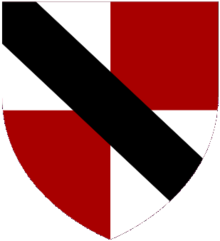Wikipedia
This text was copied from Wikipedia on 18 January 2025 at 6:10AM.

Sir Thomas Widdrington SL (died 13 May 1664) was an English judge and politician who sat in the House of Commons at various times between 1640 and 1664. He was the speaker of the House of Commons in 1656.
Life

Widdrington was the son of Lewis Mauntlaine, alias Widdrington of Cheeseburn Grange, near Stamfordham, Northumberland. He was a student at Christ's College, Cambridge in 1617 and was awarded BA in 1621. He entered Gray's Inn in 1619 and was called to the bar in 1625. He succeeded to the estate of his father in 1630. He was Recorder of Berwick from 1631 to 1658 and Recorder of York from 1638 to 1658. He was knighted at York on 1 April 1639.[2]
In April 1640 Widdrington was elected Member of Parliament for Berwick[3] in the Short Parliament. He was re-elected MP for Berwick for the Long Parliament in November 1640. As a barrister, his legal knowledge was useful during the English Civil War. In 1651 he was chosen as a member of the Council of State, although he had declined to have any share in the trial of the king.[3] He was elected MP for York in 1654 for the First Protectorate Parliament. In 1656 he was elected MP for Northumberland in the Second Protectorate Parliament and was chosen as Speaker in September 1656, and in June 1658, he was appointed Lord Chief Baron of the Exchequer. In 1659 and again in 1660, he was a member of the Council of State, and on three occasions he was one of the Commissioners of the Great Seal. He lost some of his offices when Charles II was restored.[3] In 1660, he was elected MP for York in the Convention Parliament. He was elected MP for Berwick again in 1661 for the Cavalier Parliament.[2]
Widdrington founded a school at Stamfordham, Northumberland, He wrote Analecta Eboracensia; some Remaynes of the city of York which was not published until 1877, when it was edited with introduction and notes by the Rev. Caesar Caine.[3]
Widdrington died in 1664.[2]
Family

Widdrington married Frances Fairfax, a daughter of Ferdinando Fairfax, 2nd Lord Fairfax of Cameron and had five daughters, including Ursula, who married Thomas Hickman-Windsor, 1st Earl of Plymouth, and a son. However, his son Thomas died in 1660 when MP for Morpeth. The estate at Cheeseburn Grange passed briefly to Widdrington's brother Henry and then to their brother Ralph.[2]
Notes
- ^ "Speaker Widdrington, 1656-1658". Baz Manning. Retrieved 2 February 2022.
- ^ a b c d History of Parliament Widdrington, Sir Thomas (c. 1600–64) of Cheeseburn Grange, Stamfordham, Northumberland
- ^ a b c d One or more of the preceding sentences incorporates text from a publication now in the public domain: Chisholm, Hugh, ed. (1911). "Widdrington, Barons". Encyclopædia Britannica. Vol. 28 (11th ed.). Cambridge University Press. p. 620.
4 Annotations
First Reading
Phil • Link
Elder brother of Ralph Widdrington: http://www.pepysdiary.com/encyclo…
Phil • Link
This page http://26.1911encyclopedia.org/W/… has more information on Thomas, including:
"In 1659 and again in 1660 he was a member of the council of state, and on three occasions he was one of the commissioners of the great seal, but he lost some of his offices when Charles II. was restored."
There is more information on the Council of State here: http://www.pepysdiary.com/encyclo…
Third Reading
San Diego Sarah • Link
Sir Thomas Widdrington's (c 1600 - 1664) father, Lewis Mauntlaine alias Widdrington of Cheeseburn Grange (a bastard of the ancient Northumbrian family) acquired Cheeseburn, formerly a grange of Hexham Priory, by marriage.
Most of the legitimate Widdringtons were Royalists, but Sir Thomas, ‘a good lawyer, but naturally a cautious and timorous man’, was a Parliamentarian in the Long Parliament, acting as parliamentary commissioner to the army in 1647.
Like his brother-in-law, Gen. Sir Thomas Fairfax, 3rd Lord Fairfax (in 1634 he had married Frances (d. 5 May 1649), da. of Ferdinando Fairfax, 2nd Lord Fairfax of Cameron. They had a son and 5 daughters), he would have nothing to do with the trial of King Charles, departing to the country while it was in progress, and resigning as commissioner of the great seal after the King’s execution.
But he continued to sit in the Rump. As Speaker of the second Protectorate Parliament he administered to Cromwell the oath as lord protector, and was rewarded with the office of chief baron.
He was not implicated in the military regime of 1659, and was appointed to the Council of State on its downfall.
Although Sir Thomas Widdrington MP had resigned his recorderships in the normal way on his elevation to the judicial bench, he was returned both for Berwick and York at the general election of 1660. He chose the latter constituency, where he had a house, and was entered on Lord Wharton’s list of friends, with responsibility for managing William Wilde and William Stockdale.
An active Member of the Convention Parliament, he was appointed to 41 committees and made 10 recorded speeches. On 27 Apr. 1660 he proposed the enforcement of the last ordinance of the Long Parliament by expelling all Cavaliers and their sons from the House, but failed to find a seconder.
Nevertheless he took part in recommending legal forms for the Restoration, in a conference with the Lords on the reception of Charles II, and in preparing instructions for the messengers to The Hague.
He was on the committee for the indemnity bill, and acted as chairman of the supply committee in May, and helped to prepare for a conference on the regicides.
On 28 May he was ordered to bring in the great seal of the Commonwealth to be defaced before the House rose for the day.
On 2 July, on a proposal to except iconoclasts from the bill of indemnity, he urged the immediate necessity of repairing the churches ‘and instanced the decay of York minster’.
Two days later, he strongly opposed a proviso that Protectorate officials should have to refund their salaries, saying ‘if he were included in the proviso, he were better excluded the act’, and he helped to consider three other provisos.
San Diego Sarah • Link
CONCLUSION:
On 11 July he moved for the committal of the bill of sales, a measure in which he had a personal interest as a purchaser of forfeited lands during the Interregnum.
Two days later he was given leave to bring in a bill for the enfranchisement of Durham, which, with one amendment, was sent to the Lords on 15 August.
He was among those ordered to prepare for the Journal an assertion that the Commons had the sole right to name commissioners for taxes, and to manage a conference on the poll tax.
After the recess he was chiefly concerned with the abolition of the court of wards, moving on 19 Nov. 1660 that the loss to the revenue should be made good by the grant of an excise.
He was among those ordered to bring in a clause repealing Henry VIII’s Statutes of Liveries, and to examine the coherence of the amended bill.
Wharton sent him a copy of the case for modified episcopacy, but he took no part in the debate.
He helped to prepare reasons for the conference on college leases, and to manage the conference on disbandment.
On his re-election as recorder of York, Sir Thomas Widdrington MP proposed to dedicate to the corporation the history of York which he had just completed, in lieu of the customary gifts. The corporation refused the offer, saying ‘a good purse is more useful to us than a long story’. Widdrington was so annoyed that he expressly forbade the publication of his history, which was eventually printed in 1897 under the title of Analecta Eboracensia.
He was defeated in the election for the city of York in 1661, but returned for Berwick and again listed by Wharton as a friend.
Sir Thomas Widdrington MP was not an active Member of the Cavalier Parliament, being appointed to only 25 committees in the first 3 sessions.
He took no part in the Clarendon Code, akthough he was apparently willing to conform.
He helped to consider the bill to enable Lord Widdrington, the head of the family, to sell part of his estate, and to manage the conferences at the end of the first session on the militia bill and the bill to prevent theft and rapine on the Scottish border.
Sir Thomas Widdrington died on 31 May, 1664, and was buried in St. Giles in the Fields. His Northumberland estate, valued at £800 p.a., was inherited by his brother as his son had died; but the rest of his property was divided among his daughters, all of whom married well.
For his many offices and appointments, see https://www.historyofparliamenton…